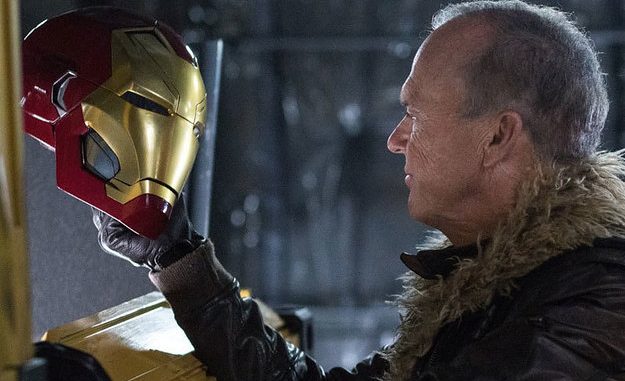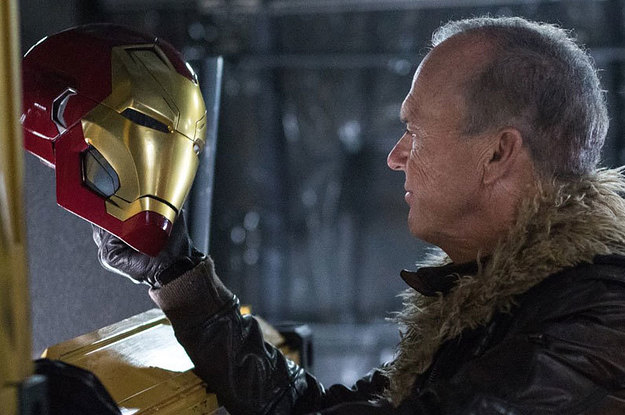

The greatest Michael Keaton moment in Spider-Man: Homecoming is the one in which his character, Adrian Toomes, turns and slings his arm over the back of the passenger seat of his car and threatens Peter Parker (Tom Holland). It’s a position assumed by adults about to lecture kids they’ve driven around for time immemorial. Keaton’s delivery really seals the deal, the way he tells the 15-year-old in his backseat that “I’ll kill you and everybody you love — I’ll kill you dead,” and the line manages to land halfway between criminal menace and parental chastisement.
Then he tacks this can-you-believe-it face waggle to the end of his bit about “of all the reasons I didn’t want my daughter to date,” as if they’re two grown men chatting on the same level, as if he hadn’t just promised murder if Peter doesn’t walk away. Adrian’s just figured out the guy taking his daughter Liz (Laura Harrier) to homecoming also happens to be the superhero who’s been getting in the way of his criminal enterprise. But the whole scene sells us on the idea that Liz’s escort would be getting some kind of intimidating speech regardless of who he was. The fact that Peter is also Spider-Man is practically a convenience for Adrian, who gets to give a dad talk and a supervillain rant simultaneously.
Some villains are bent on operatic revenge, some long to watch the world burn, and some seem to show up because the heroes would have nothing to do otherwise. But Adrian Toomes, otherwise known as the Vulture, pulls off being one of the most memorable comic book movie baddies in recent memory by evoking a dread that hits closer to home. He’s your friend’s dickish dad, or, in Peter’s case, something even more awkward: his crush’s dickish dad, who treats handshakes with other guys as a test of manhood and whose expansive suburban house seems chosen to broadcast how impressive his own is.
Adrian is the kind of dude who gets a kick out of jokily wielding a giant kitchen knife when Peter comes by to pick up Liz, but who also happens to have a serious cache of enhanced weaponry he’s used to kill before. The overprotectiveness, anyway, doesn’t seem directly related to fears about his daughter, who’s shown to be smart, self-possessed, and well-aware of how dazzled and intimidated Peter is by her. No, the I-have-an-alien-shotgun routine is mostly posturing, an assertion of dominance, Adrian giving this polite young man the what-for while also seeming disappointed by how unnecessary it clearly is.
The best aspects of Spider-Man: Homecoming are pure teen movie, so it’s only appropriate that the Vulture is a grown-up bully — one who, Walter White–style, rationalizes his illegal dealings as the actions of someone just trying to get by. In the film’s prologue, Adrian makes his heel turn from salvage biz operator to crook when the cleanup he has a contract for gets snatched away from him by a new government initiative. His pleas about supporting his family and potentially losing his house have an urgency there that’s gone by the time the movie catches up with him eight years later, but he’s still trotting them out. It’s to protect that family, he says, that he’d kill Peter, as well as to protect the illicit mini empire he’s built — not an excuse that anyone’s buying except maybe Adrian himself.
There’s a thread of disgruntled Trump affiliation running through Adrian’s concerns about, er, economic uncertainty, in the way his not-unjustified indignation of corporate-government collusion crushing his small business leads him down a road to darker choices. After being kicked off the job, he and his crew lounge in the dark, bitterly watching the news about how Stark Industries has basically taken their place in picking up the pieces of a war that Tony Stark (Robert Downey Jr.) participated in — an effective bailout. In the words of one of Adrian’s employees (Bokeem Woodbine), “The assholes who made this mess are getting paid to clean it up.”
And yet when Adrian rants about the rich and powerful in his big monologue at the end of the film, he’s not interested in righting their wrongs, but in partaking in their ability to grab as much for themselves as possible. He talks about himself as a member of the working class that the 1% ignores — “we build their roads and we fight all their wars and everything, and they don’t care about us” — and yet what he seems to want most is to join their ranks. His final act as the Vulture isn’t one of war but of greed, leaving his skirmish with Spider-Man behind to grab for the spoils of his ill-advised big job, a scoundrel Icarus trying to fly off on failing mechanical wings. Keaton is so good in the role because he’s careful to present Adrian as not bloodthirsty, not cartoonish — just a tribalist who’s decided that everything is justified if it’s in the name of family.
Adrian Toomes is this poisoned patriarch, a man who has weaponized his resentment and his desire to do right by those close to him when what he’s really doing is bolstering his own image as a provider and a success, to those around him and to the wife and daughter who have no idea what he’s been up to. Which gives added sweetness to Peter as this boy being raised by a single woman, he and Aunt May (Marisa Tomei) shown muddling through how to tie a tie together with the help of YouTube instructionals when he has to get dressed up for the dance.
May’s advice to her nephew on how to behave toward Liz — “open the door for her, tell her she looks nice, but not too much because that’s creepy” — stands in contrast to Adrian’s quizzing, based as it is on the assumption that what he needs to know is how to treat the young woman with respect, not to be warned about what he can get away with. Spider-Man: Homecoming presents Peter Parker with a possible (if unreliable) father figure in Tony Stark, but it’s really May who ends up being the best counterpart to Adrian, a parent intent on foremost making sure her charge grows up to be good.

